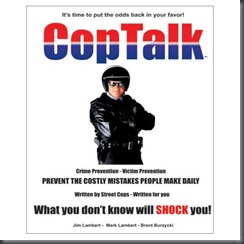Junk mail can not only be a pain to sift through each day, but it can cause long term headaches. False charges, ruined credit history, and more if not disposed of properly. Most crooks are rather stupid, but some are just the opposite. Some crooks drive through residential neighborhoods grabbing mail from street-side mailboxes. Police and Sheriff’s Departments often stop vehicles that are loaded with stolen mail. What are the thieves looking for? Mostly incoming checks, credit cards, or outgoing checks. Thieves use a technique to remove the payee name and put their bogus name, keeping the valid signature and other information on the check. Or they may write in the name of a fellow crook giving them a percentage to cash the check. All this happens before anyone suspects a thing.
These thieves usually look for the completed documents to alter into profits for themselves. There are a few precautions you can take against mailbox thefts that we will talk about in a moment.
I’m sure if you have good credit, you get bombarded with several pieces of mail EACH DAY offering refinancing for home loans, offers for free credit cards, pre-approved loans, etc. Most people just throw them in the trash and forget about them. But for some crooks, that is just what they want.
Here is a short story of what can happen:
You get an offer (one of several you receive daily) for a free Visa credit card. You pick out the needed mail and throw the junk mail in the trash. If you live in a real nice area, you may have thieves take or go through your garbage at night to find these precious treasures. Other thieves actually go to the dump, and go through garbage. You would be surprised at what they find. Stuff you throw away without even looking at it or thinking about it. Things that disclose all of your personal information. Drivers License numbers, Social Security numbers, your phone number, family member names and even your signature. It is like leaving a key out which opens your financial doors.
A crook can take one of those unopened credit card offers that you tossed in the garbage like a hot potato, along with a little personal info. they found in the same garbage bag and fill out the application. They even found a signature of yours in the garbage. With personal information such as a driver’s license or social security number on the application, very few credit card companies will call you to verify that you sent in the application. A month or two later, you get a Visa bill in the mail with a 3-4 thousand dollar balance. WOW, that’s not even your visa company. What happened? After the crooks sent in your application (the one they found in your garbage nice and intact, not even opened) they began to check your mailbox a few weeks later, right when the mail truck leaves. Or they stop the mail truck down the street from your house and ask the mailman if he has any mail for such and such address, (yours) that they had to leave and could they please get their mail. Most will succeed unless the mailman knows you on sight.
Now the crooks have a credit card in your name, and even your signature from the garbage. A crime spree begins. After several days of shopping, the crooks have thousands of dollars of merchandise. Alot of stores simply run credit cards through a scanner to find stolen or closed account cards. Since you are unaware this card even exists; it will show as good until you or the company find out what happened. Some companies, after seeing lots of activity or high dollar purchases on a card will contact you to see if you are aware of the cards usage. But by the time this happens, the crooks discard or sell the card to another thief after they made quite a profit selling the merchandise they bought with the card IN YOUR NAME. Chances are you will not be liable for the charged amounts after the situation is discovered, but it will be a pain for you to take the time to straighten the matter out, having to provide proof to the company that it was not you, and hopefully you were not reported to the credit bureau yet. What a nightmare to try to straighten out bad credit reports in your name. Remember, alot of stores rarely ask for another form of ID if the card passes the scanner. I compliment the stores who do ask for a driver’s license or other ID. All this, just because you threw away a piece of junk mail you didn’t want (but alot of other people do) I accidentally lost a gas credit card at a gas station once. Luckily, this company kept track of a customer’s average usage and if that was exceeded, they called you. I was unaware of the lost card since I only used it once a week. About 4-5 days after I lost my card, I got a call from the company asking if I still had my cards, Yeah, I said, what’s the problem. They asked if I could physically check for my card to make sure, and I discovered mine was lost. They then informed me that over $400 was charged to my card in the last 4 days, and due to the large increase in usage, they called to verify the charges. A dirtbag was using my card, offering other dirtbags to fill up on my card for $10 cash. What a scam! Luckily, I was not held liable for the charges, but it was a hassle to work out which charges were mine, to cancel all my cards and to get new ones.
We all pay for these types of illegal charges. Through higher pump prices at the gas station, higher prices at the store checkout counters, higher interest rates on the credit cards. We all pay in the end through higher prices or rates. I was shocked one day, as I was arresting a woman caught embezzling money from a major department store in my city (she had been doing it for about a month prior to being caught) and I asked about the dollar loss from shoplifting, forgery, and employee theft. The security manager told me “about $50,000” I asked a year? and they said no, a month. One store in a chain, $50,000 a month. Who do you think pays for that? You and me, every time we go through the checkstand. Think of the whole chain dollar loss across the states, that’s ALOT of money. To stores, that’s part of doing business.
Click below to read the rest of the story:
But that’s my point here. If we can put a stop to the forgeries and credit card fraud that starts in our neighborhoods, we can start to reduce the losses to business, which result in lower prices down the road. How you ask?
Here are a few tips:
• If you have bills to mail out which contain checks, or something extremely important. Don’t trust it unattended in your mailbox. Give it straight to the mailman, or drop it off at the post office or local mailbox on the corner. Inconvenient you say? I know there has to be a mail collection box within a mile of every house, they’re all over (and alot more secure). It may be inconvenient to drive a block to find a secure drop box, but think of the inconvenience of straightening out your credit if your checks get stolen, forged, and cashed.
• If you throw anything in the garbage with any kind of information about you or your family, cut or tear it up first. Better yet buy yourself a shredder. Every credit card or loan offer you throw away whole can provide a crook with information about you. Take a second to rip them or cut them up. No credit card company is going to issue a card with an application that was taped together from a bunch of little pieces. Or at least they would call to verify the application. This goes for anything you discard with your information on it. You’d be shocked at how many crooks go through garbage looking for things they can use. They don’t work; this is their job. And some are good at it.
• Destroy ALL receipts that have credit card information on it BEFORE you throw it away. All a crook needs is your credit card number, expiration date, and the name on the card. (All listed on the statement form or store receipt you just tossed away) With this information, (they don’t need the actual card), the crooks can order merchandise by phone and have it sent to a bogus address. Weeks later, you get a huge bill, and the crooks made a nice bundle of cash selling the stuff. You cancel the card and the crooks go on to another victim.
• Electronic bill paying. Some banks offer home banking, where you can do basic banking and bill paying by computer. You install a program (free from the bank) on your computer, set up a private password, and you can pay almost all your bills by e-mail. I pay my phone, cable, PG&E, house payment, telephone, almost every bill I have I pay by computer. Secure, and even saves on postage. If you can pay by computer, it takes alot of risk out of paying bills.
• If you suspect mail theft, contact the police or postal authorities. Don’t wait until bills start to mount up from unauthorized use. We don’t chase lost mail, but if you see someone suspicious in the area, taking mail from a mailbox, get a good description of the person and car, and call the police. Chances are we will catch them with alot of other people’s mail, maybe yours.
• Get your mail as soon as possible. The longer it sits, the easier it is to become a target. Most of the time, mail delivery is about the same time every day, give or take an hour. Try to get your mail, or have your children grab your mail as soon as possible after delivery. If your going to go away, make arrangements to have it picked up, or notify the post office to stop delivery during the time you’ll be away.
• Put your outgoing mail out close to the pickup time, or give it directly to the mailman. (We can all hear a mailtruck coming up the street; they have a distinctive sound) That little red flag you raise up on the mailbox not only alerts the mailman that you have mail to go, it also alerts the crooks. Thieves actually drive through residential areas looking for raised red flags on mailboxes. Raised red flags usually mean outgoing checks. Like we said, if it is important, drive a block to a secure mailbox.
• If you close out a checking account, burn or destroy (at least cut up) all the unused checks. Don’t assume that just because the account is closed, someone can’t use the checks and create a paper trail leading back to you. Happens all the time. I still get dispatched to forgery cases with forged business checks from a business that closed over 2 years ago in my city; the bad checks are still around.
• Don’t ever give out personal information over the phone. A crook may call claiming to be a representative of a company, asking you personal information such as bank account numbers, social security numbers, credit card numbers, or even password numbers. Don’t give this information out unless you know for sure whom you are talking to. Ask for a call back number, or employee number. Then call back and ask for a supervisor to verify the procedure if you feel uncomfortable about it.
Some neighborhoods mount a large postal station in a court or on a corner which contain several small numbered boxes for certain addresses within the court or street. Each house has a key that fits only that mailbox assigned to that address. Other neighborhoods build houses which have mail slots built directly into the wall or garage door. Once the postman drops the mail in, it is impossible to get it out unless you are inside the garage. (You can’t have outgoing mail with these)
But most neighborhoods, whether rural or urban, usually put the mailboxes at street side, making it convenient for postal employees to quickly drop off and collect mail without leaving their vehicles. Cost efficient they say. Unfortunately, it makes it all too easy for the crooks to play mailman. Take everything the postman left, keeping what will help them, and throwing the rest in a field, or a dumpster. The kids’ pictures at their 1st birthday party, the letter from a close friend, the insurance policy you needed to sign. All thrown away when you didn’t notice it missing in the first place. Post office boxes are secure, but you pay for them. If you deal with mail that’s valuable, especially a home business, it would be worth it.
Don’t let convenience rush you into something that can hurt you later. There is nothing worse than a dirtbag stealing your identity for a month, running up bills and ruining your credit. Your probably getting tired of the phrase “could this be avoided” Good, when you get tired of it, it might sink in. YES, most forgeries can be avoided by being careful about what information you throw away, put in the mailbox, or how well you guard your personal information.
A few moments of precaution can save you hours, weeks or even months of rebuilding your financial records or reputation.




